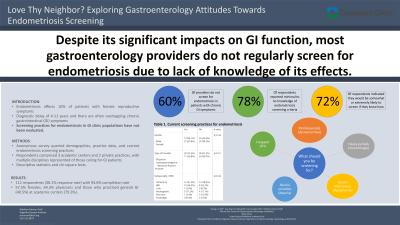Sunday Poster Session
Category: Practice Management
P1487 - Love Thy Neighbor? Exploring Gastroenterology Attitudes Towards Endometriosis Screening
Sunday, October 27, 2024
3:30 PM - 7:00 PM ET
Location: Exhibit Hall E

Has Audio

Madison Simons, PhD
Cleveland Clinic
Cleveland, OH
Presenting Author(s)
Yuying Luo, MD1, Xiao Jing (Iris) Wang, MD2, Laurie Keefer, PhD3, Madison Simons, PhD4
1Mount Sinai Center for Gastrointestinal Physiology & Motility, New York, NY; 2Mayo Clinic, Rochester, MN; 3Icahn School of Medicine at Mount Sinai, New York, NY; 4Cleveland Clinic, Cleveland, OH
Introduction: Endometriosis is a common inflammatory disease affecting up to 10% of patients with female reproductive symptoms with debilitating impact on quality of life. Patients with endometriosis face a diagnostic delay of 4-11 years and frequently present with overlapping chronic gastrointestinal (GI) symptoms. Screening practices for endometriosis in GI clinic populations have not been evaluated.
Methods: An anonymized exploratory survey was sent to a total of 294 providers (physicians, gastropsychologists, advanced practitioners) at 3 academic centers and 2 private practices caring for adult GI patients. Demographics, practice data, and current endometriosis screening practices were queried. Categorical and numerical variables were summarized by descriptive statistics, comparative analysis were conducted using chi-square tests.
Results: 112 respondents answered the survey (38.1% response rate) with 94.6% completion rate. The majority of respondents (57.5%, n=65) identified as females, physicians (64.3%, n=72) and those who practiced general GI (40.5%) at academic centers (79.3%). Most respondents (59.4%, n=63) do not screen for endometriosis in patients with chronic GI symptoms, citing lack of knowledge on how to screen as the most common reason. 78% of respondents reported minimal to no knowledge of screening criteria for endometriosis. Providers were not more likely to screen depending on gender, type of provider or subspecialty of provider (e.g. IBD, neurogastroenterology and motility). The majority (72.1%) of providers reported they would be “extremely likely” or “somewhat likely” to screen for endometriosis after being presented with data on the high prevalence of chronic GI symptoms in patients with endometriosis (Table 1).
Discussion: The majority of gastroenterology providers including physicians, gastropsychologists, and advanced practitioners currently do not screen for endometriosis in their patients with female reproductive systems and chronic GI symptoms. In most cases, failure to screen was due to lack of knowledge of the condition and its effects on GI function. Most surveyed providers would use a screening tool for endometriosis if it was available, highlighting the need for increased education and resources on this intersection.
Note: The table for this abstract can be viewed in the ePoster Gallery section of the ACG 2024 ePoster Site or in The American Journal of Gastroenterology's abstract supplement issue, both of which will be available starting October 27, 2024.
Disclosures:
Yuying Luo, MD1, Xiao Jing (Iris) Wang, MD2, Laurie Keefer, PhD3, Madison Simons, PhD4. P1487 - Love Thy Neighbor? Exploring Gastroenterology Attitudes Towards Endometriosis Screening, ACG 2024 Annual Scientific Meeting Abstracts. Philadelphia, PA: American College of Gastroenterology.
1Mount Sinai Center for Gastrointestinal Physiology & Motility, New York, NY; 2Mayo Clinic, Rochester, MN; 3Icahn School of Medicine at Mount Sinai, New York, NY; 4Cleveland Clinic, Cleveland, OH
Introduction: Endometriosis is a common inflammatory disease affecting up to 10% of patients with female reproductive symptoms with debilitating impact on quality of life. Patients with endometriosis face a diagnostic delay of 4-11 years and frequently present with overlapping chronic gastrointestinal (GI) symptoms. Screening practices for endometriosis in GI clinic populations have not been evaluated.
Methods: An anonymized exploratory survey was sent to a total of 294 providers (physicians, gastropsychologists, advanced practitioners) at 3 academic centers and 2 private practices caring for adult GI patients. Demographics, practice data, and current endometriosis screening practices were queried. Categorical and numerical variables were summarized by descriptive statistics, comparative analysis were conducted using chi-square tests.
Results: 112 respondents answered the survey (38.1% response rate) with 94.6% completion rate. The majority of respondents (57.5%, n=65) identified as females, physicians (64.3%, n=72) and those who practiced general GI (40.5%) at academic centers (79.3%). Most respondents (59.4%, n=63) do not screen for endometriosis in patients with chronic GI symptoms, citing lack of knowledge on how to screen as the most common reason. 78% of respondents reported minimal to no knowledge of screening criteria for endometriosis. Providers were not more likely to screen depending on gender, type of provider or subspecialty of provider (e.g. IBD, neurogastroenterology and motility). The majority (72.1%) of providers reported they would be “extremely likely” or “somewhat likely” to screen for endometriosis after being presented with data on the high prevalence of chronic GI symptoms in patients with endometriosis (Table 1).
Discussion: The majority of gastroenterology providers including physicians, gastropsychologists, and advanced practitioners currently do not screen for endometriosis in their patients with female reproductive systems and chronic GI symptoms. In most cases, failure to screen was due to lack of knowledge of the condition and its effects on GI function. Most surveyed providers would use a screening tool for endometriosis if it was available, highlighting the need for increased education and resources on this intersection.
Note: The table for this abstract can be viewed in the ePoster Gallery section of the ACG 2024 ePoster Site or in The American Journal of Gastroenterology's abstract supplement issue, both of which will be available starting October 27, 2024.
Disclosures:
Yuying Luo indicated no relevant financial relationships.
Xiao Jing (Iris) Wang indicated no relevant financial relationships.
Laurie Keefer: ardelyx – Consultant, Grant/Research Support. coprata health\ – Advisory Committee/Board Member. pfizer – Consultant. trellus health – Consultant, Stock-publicly held company(excluding mutual/index funds).
Madison Simons indicated no relevant financial relationships.
Yuying Luo, MD1, Xiao Jing (Iris) Wang, MD2, Laurie Keefer, PhD3, Madison Simons, PhD4. P1487 - Love Thy Neighbor? Exploring Gastroenterology Attitudes Towards Endometriosis Screening, ACG 2024 Annual Scientific Meeting Abstracts. Philadelphia, PA: American College of Gastroenterology.
